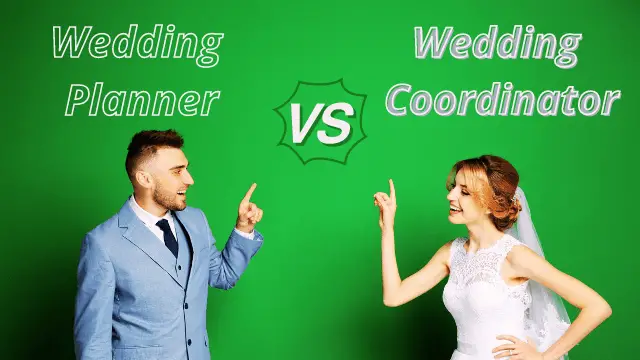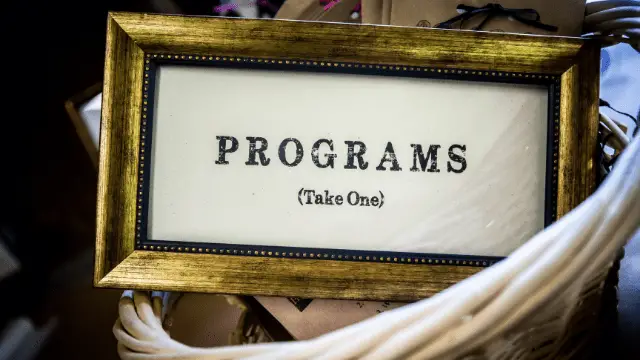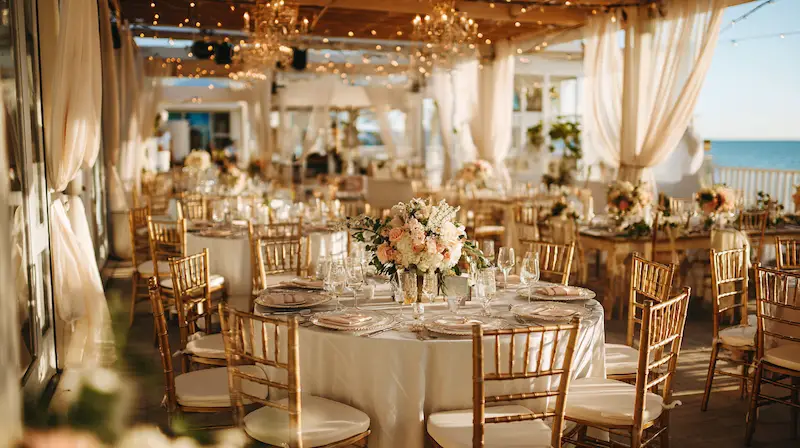Wedding Planner Vs. Coordinator (Explained)
When you start planning your wedding, the options of hiring a Wedding Planner Vs. Coordinator will come at you from different angles. Here is what you should expect from each of them.
A Wedding Planner literally plans the long-range aspects of your wedding, and a Wedding Coordinator actually coordinates your wedding after you already planned the bulk of it yourself.
“Planning” includes site selections, budgeting, design, food and beverage choices, florals, entertainment, programs, etc., plus everything a coordinator does.
“Coordinating” involves making sure everything that should be set up is set up correctly and per the plan, ensuring all vendors are where they should be, and that everything is flowing smoothly throughout your event.
A fully-fledged and well-seasoned wedding planner will often offer both a full wedding planning package and a day-of coordinator package in their portfolio for you to choose from.

What Are The Benefits of Hiring A Wedding Planner
There are many benefits to hiring a wedding planner for your big day. However, if you are considering whether or not you need a professional, there are a few things that you need to consider.
First, is anything else going on in your life?
Are you trying to figure out how to juggle work and family and plan an event?
A wedding planner can help relieve the pressure of this monumental task.
They can help organize the event by getting quotes for vendors and researching new locations that will meet all your needs within your budget.
Having them there on the day of the event can be especially helpful with handling last-minute issues.
Secondly, do you have all the time in the world?
Organizing an event such as a wedding can take months of planning and multiple research trips to determine what style, theme, and vendors will suit your taste.
However, if you need it done quickly or are too busy with other obligations, hiring a planner can help relieve some stress.
They will work closely with each vendor and constantly contact the venue and other service providers.

What Does A Day-of Wedding Coordinator Do?
A day of coordinator joins about four to eight weeks before your wedding, learns your plan, then runs the event day so you can stay present.
What they handle before the wedding
- Finalize the master timeline and run of show
- Confirm all vendors and centralize contacts
- Lead the rehearsal and align the wedding party
- Walk the venue to mark load in, cueing, and flow
- Spot check contracts for conflicts or gaps and flag issues
What they handle on the wedding day
- Vendor check in, cueing, and problem solving
- Room flips and transitions that keep the pace smooth
- Set up of paper goods and small decor such as escort cards, place cards, table numbers, favors, programs, and signs
- Guest guidance from ceremony to cocktails to dinner to dance
- End of night wrap, gift and keepsake handoff, and gratuity distribution if agreed
What is not in scope
- Full vendor search, deep design development, or a budget build from scratch
Pro Tip: By the time you hire a coordinator, your key vendors are usually booked. Share your contact list and floor plan in one document so the handoff takes minutes, not days.
What Does A Wedding Planner Do?

A planner is your strategist from day one. They turn your vision into a workable plan, protect your budget, line up the right pros, and keep every moving part on schedule so you can enjoy the ride.
Core responsibilities
• Build a budget framework and keep you on track with due dates
• Curate vendor shortlists, schedule site visits and tastings, and compare proposals side by side
• Create the master timeline for the months before the wedding and the event day
• Translate your style into a cohesive design plan with floor plans, mood boards, and rental pulls
• Review and negotiate contracts, flag risky clauses, and align deliverables with your venue rules
• Lead rehearsals and map the production sequence so everyone knows their cues
During the final months
• Orchestrate vendor walk throughs and logistics from load in to strike
• Coordinate holds for rentals, transportation, and special services
• Manage communications in one thread so decisions move fast
• Track all deadlines for payments, counts, and print items
On the wedding day
• Direct vendor arrivals and solve problems before you hear about them
• Quality check decor, tables, paper goods, and lighting against the plan
• Keep catering and entertainment in sync so service and moments flow
• Support you and your VIPs with calm guidance and quick fixes
Expert Insight: Planner involvement often runs eighty to four hundred fifty hours depending on scope and guest count. That is why the right planner can save you weeks of personal time and costly do overs.
Actionable Tip: Agree on three guardrails at kickoff budget ceiling, decision timeline, and must have look. With those set, your planner can move approvals faster and reduce meeting time.
How to get the most value
- Share a single folder with contracts, floor plans, menus, and contact lists
- Approve vendor shortlists in batches instead of one by one
- Let your planner be the point person for family opinions so you stay out of the crossfire
- Before you sign anything, scan this wedding planner contract checklist for must-have clauses and red flags.
Key Takeaway: A coordinator executes a finished plan. A planner builds the plan, keeps it aligned with budget and venue realities, and then executes it with you from first idea to last song.

Wedding Planner Vs. Coordinator (What They Have In Common)

- On site point of contact for you, your vendors, and your wedding party from rehearsal through last song
- Keep the day of timeline accurate and the event pace fluid
- Oversee set up and styling checks at the venue
- Coordinate with entertainment, catering, and service teams so dinner service pairs with announcements and moments
- Troubleshoot last minute needs and tiny emergencies
- Provide personal assistance such as comfort kits, spare footwear, and gift table oversight
- Place and straighten paper goods and small decor once and only once in this list to avoid duplicate mentions
Key Takeaway: Whether you choose a planner or a coordinator, the shared goal is a smooth, well-paced guest experience. The difference is when they start and how much strategic planning they have.
So What Does A Venue Coordinator Do?
A venue coordinator represents the location. Think catering or sales manager employed by your venue. Their job is to protect house standards and deliver the food and beverage service you purchased.
What they own inside the venue
- Date holds, room assignments, access times, and security requirements
- Floor plans using house standards and safety rules
- Banquet and culinary timeline and service pacing
- House staff scheduling and supervision
- Venue equipment managed through the venue tables, chairs, china, linen, staging, coat check
- Load in and load out instructions, dock access, power locations, and insurance certificates
- Final walkthrough, menu planning, and back of house logistics
What they do not own
- Off site ceremony logistics or transportation
- Full creative design or styling beyond house inventory
- Sourcing outside vendors or building your budget
- Month by month planning timeline before the event
- Managing family dynamics, RSVPs, or welcome bag runs
- Anything that falls outside the venue contract
How they partner with your planner or coordinator
- Venue sets service cadence while the planner runs the overall run of show
- Venue manages house staff while the planner cues outside vendors and formalities
- One shared packet works best updated floor plan, timeline, vendor list, and contact sheet
Cost note
- Usually included in the venue pricing or service charge structure
Pro Tip: Ask for a one page scope list of what the venue will set up. Table numbers, place cards, favors, candles, signage. Clarity here prevents the who handles that moment.
Actionable Tip: Confirm house policies in writing access times, sound limits, open flame rules, confetti or sparkler rules, vendor cut off, overtime fees, and storage before or after.
Expert Insight: At strong venues a capable venue coordinator can cover most day of logistics inside the building. You still hire a planner or coordinator for strategy, vendor sourcing, and leadership across locations.
Key Takeaway: The venue coordinator champions the venue. Your planner or coordinator champions you across every location and every vendor.
Comparison Table Wedding Planner, Wedding Coordinator, and Venue Coordinator
| Role | When to hire | What they own | What they do not own | Typical cost band |
|---|---|---|---|---|
| Wedding planner | You want strategic help from day one | Budget framework, vendor shortlists, design direction, timeline for months and event day, contract review, tastings, rehearsals, production | Venue enforced policies and staffing decisions | Percent of total budget or flat fee. Often ten to twenty percent or a flat starting around four thousand and up depending on market and scope |
| Wedding coordinator | You booked the venue and most vendors | Final timeline, vendor confirmations, rehearsal management, ceremony and reception flow, setup of paper goods and small decor, cueing | Full vendor search, deep design development, budget build | Often one thousand five hundred to three thousand five hundred depending on region and complexity |
| Venue coordinator | You are using the venue’s catering or package | Floor plans with house standards, banquet and culinary timing, house staff, venue access, rentals managed through venue | Offsite ceremony, transportation, styling details, family dynamics, anything beyond the venue’s scope | Included in venue offering or service charge structure |
When you are better off choosing each option
- Choose a planner if
- You want design leadership and vendor curation
- Your job is demanding and you cannot spend five to eight hours a week on planning
- You want one person accountable from start to final send off
- Choose a coordinator if
- You booked the venue and key vendors
- You want a pro to own the run of show and vendor wrangling
- You need someone to translate your plan into a smooth event day
- Rely on the venue coordinator for
- Floor plans, banquet timing, staff assignments, back of house logistics
- Anything that lives inside the venue contract
Final Thoughts
Many couples are in a position where they need to find the right person for their wedding, and not everyone has an idea of what they need or how to go about it.
There are so many options available. It can be difficult picking one!
Wedding planners assist long-term with all aspects of your wedding. They do this by interviewing you and making sure that you and your partner are organized enough to make sound decisions. From there, they will then create a plan for the event and carry it out.
Wedding Coordinators come in later in the game after you already planned out most of the bulk of your event.
Like a wedding planner, they will manage and organize all the moving parts of your event on the day of your wedding



Pingback: How To Plan A Wedding Without a Wedding Planner: 16 Tips - Wedding CheckPoint